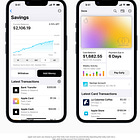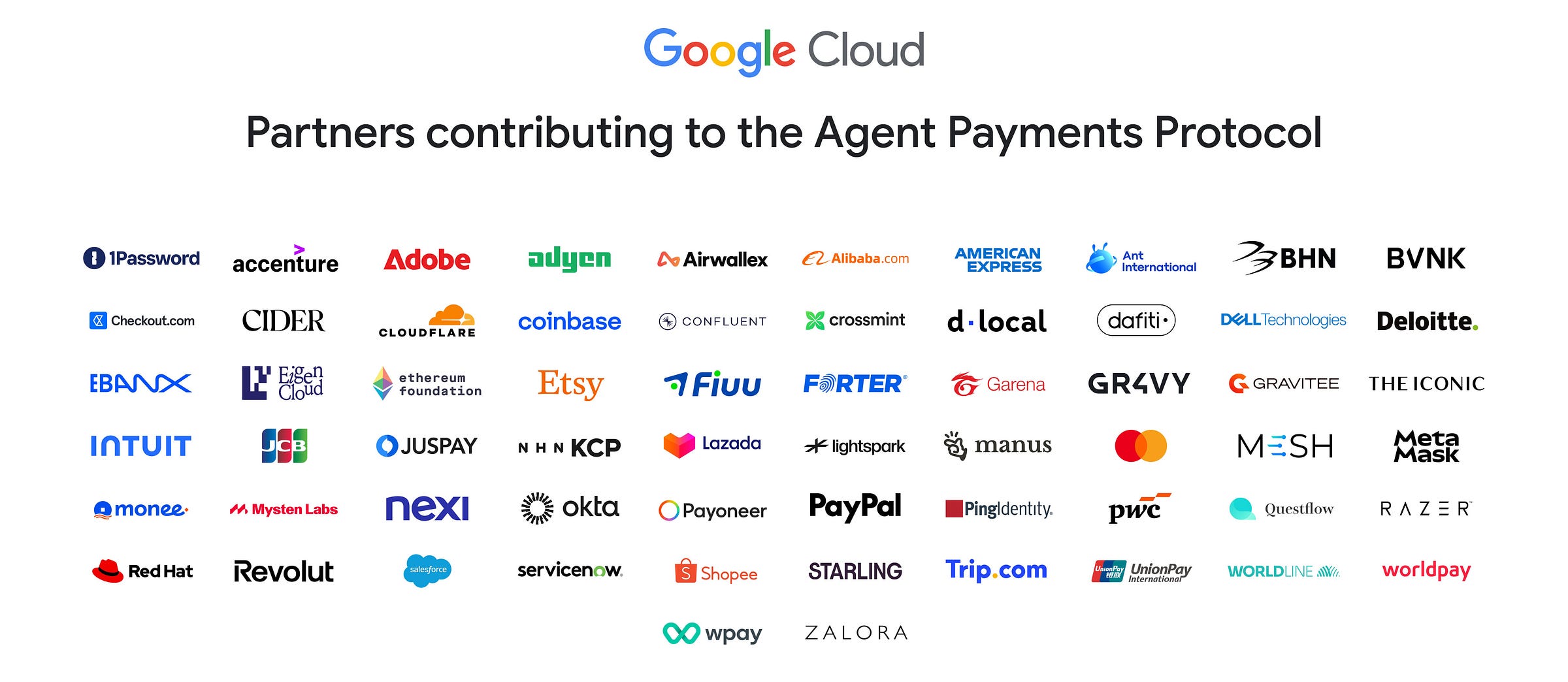Analysis: Should banks fear Google's Fintech comeback?
Google Unveils Agent Payments Protocol Backed by 60+ Partners, plans Ledger
Gm Fintech Architects —
Today we are diving into the following topics:
Summary: We examine how Google’s re-entry into fintech with the launch of the Agent Payments Protocol (AP2) marks the beginning of a new phase of agentic commerce, where AI agents can safely make payments on behalf of users. AP2 is backed by over 60 major partners and enables secure, cryptographically authorized transactions across various payment types, including cards, bank transfers, and stablecoins. Google is positioning itself as the core infrastructure provider for this emerging commerce layer, directly competing with Stripe, which is building its own Layer 1 blockchain (Tempo) for similar use cases. As Big Tech expands into programmable payments and financial networks, a duopoly is emerging between Google (enterprise-focused) and Stripe (startup-focused) in controlling agent-initiated financial flows.
Topics: Google, Stripe, Apple, Coinbase, Adyen, Mastercard, PayPal, Revolut, Worldpay, Circle, MetaMask, Anthropic, OpenAI, Tempo, Privvy, Bridge, Synapse, IBM Hyperledger, Tron, Arbitrum, Polygon, Quorum, MegaETH
To support this writing and access our full archive of newsletters, analyses, and guides to building in the Fintech & DeFi industries, see subscription options below.
Our Ecosystem: AI Venture Fund | AI Research | Lex Linkedin & Twitter | Sponsors
Long Take
Big Tech in Finance
A few years ago, big banks were under attack from two directions.
The first was Fintechs — companies that were telling the story of being the new, modern, technologically advanced version of financial institutions. Today, crypto protocols are the more revolutionary approach to the same idea.
The second, however, was Big Tech.
While banks could rationalize away the concept of smaller fintechs trying to take away their market share as irrelevant — who wants those small accounts anyway — they could not rationalize away the fact that Google and Apple had way, way more distribution.
Add to that Ant Financial, the massively successfull Asian fintech that pre-empted the banks from doing very much in payments for a while, and you get the sense that “finance” is a *feature* inside of the Big Tech platforms.
Web2 frameworks like, Aggregation Theory, supported this view, and we have written about it in some classic takes here, suggesting that many financial products will become commoditized and served to customers without any financial brand, as if they were pharmaceutical generics. Aren’t banking apps merely buttons in your iPhone?
All that ended up getting turned into embedded finance, which collapsed with Synapse, and which is now, in turn, being transformed into stablecoins on blockchains. American banks have largely repelled any open APIs — just see JP Morgan charging Plaid for database access.
Further, Google and Apple attempts to overtake neobanks have sort of fizzled out. Famously, Google’s direction from payments into wallets failed to land and the team dissipated. Apple, however, has stayed within proximity payments, and has succeeded in creating a new consumer behavior that dwarfs paytech competitors. The companies ended up being successful in transactions, and unsuccessful in balances or deposits.
These top 3 articles felt like a huge blow to Fintech at the time, but ended up not doing very much displacement of independent companies. And it wasn’t the banks that suffered. I think that’s because — if we are talking about a financial feature — the app maker, which is the bank in this case, is better at that app than the platform. Apple’s messaging service isn’t as loved as WhatsApp, for example, even if it has the advantage of being the default.
Under the prior political regime, the CFTC was going to treat Big Tech like Big Banks if they were significantly handling customer funds. And pushing Apple around is indeed useful, especially cracking its immoral 30% tax on all platform commerce activity. But under the new regime, tech is no longer constrained, and playing for much more than before in financial services.
Which brings us to Google re-emerging in Fintech land.
The Financial Platform
Google has just introduced the Agent Payments Protocol (AP2) — a new open standard meant to let AI agents safely initiate payments on behalf of users. The protocol launched with backing from over 60 organizations, including major players like Adyen, American Express, Coinbase, Mastercard, PayPal, Revolut, and Worldpay.
AI agents are increasingly doing more than just suggesting things.






